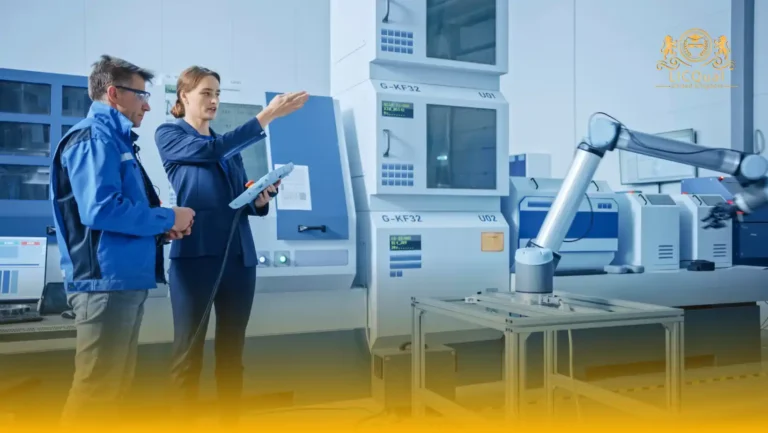The LICQual Level 2 Award in Rigger is a globally recognized qualification that equips learners with the practical skills and advanced knowledge needed for safe and effective rigging operations. This intermediate-level course is designed for individuals who already have basic rigging experience or qualifications and are looking to take on more responsibility within lifting teams. It prepares participants to perform rigging duties confidently, safely, and in accordance with international regulations and best practices.
Rigging is a critical function in industries such as oil and gas, construction, shipping, logistics, and heavy engineering. Improper rigging can lead to serious accidents, operational delays, and costly damages. The LICQual Level 2 Award builds on foundational concepts by focusing on more complex lifting scenarios, rigging configurations, and the correct selection and inspection of lifting gear. Participants will learn to assess risks, follow lift plans, and contribute meaningfully to safe lifting operations in high-risk environments.
The course content includes in-depth training on advanced rigging techniques, load calculations, center of gravity identification, sling angle factors, and communication protocols during lifting operations. Learners are taught to recognize load types, determine the safest lifting approach, and select appropriate rigging equipment for the task. This level of training enhances the participant’s ability to handle varied and challenging rigging tasks with precision and confidence.
Another core element of this course is hazard recognition and risk mitigation. Candidates will be trained in pre-lift assessments, dynamic risk evaluation, and responding to unexpected challenges during lifting operations. Emphasis is placed on compliance with occupational health and safety standards such as LOLER (Lifting Operations and Lifting Equipment Regulations), PUWER (Provision and Use of Work Equipment Regulations), and other internationally accepted practices.
In addition to technical training, this qualification sharpens learners’ awareness of teamwork, coordination, and accountability during lifting operations. Participants are expected to understand their role within a lifting team and communicate effectively using standard hand signals and radio protocols. They will also explore the legal responsibilities of riggers and the importance of documentation, including inspection checklists, lift plans, and incident reporting.
Ideal for semi-skilled riggers, lifting assistants, and workers aiming to progress to supervisory or specialized roles, the LICQual Level 2 Award in Rigger bridges the gap between beginner-level training and advanced certifications. The qualification adds credibility to a rigger’s professional portfolio and demonstrates a commitment to safety and technical excellence. For employers, investing in certified riggers at this level enhances on-site safety, efficiency, and compliance.
Upon successful completion of this program, candidates will be awarded an internationally recognized certificate that validates their competence in intermediate rigging operations. This qualification is an essential step for those looking to work in safety-critical industries where precise lifting and rigging skills are not just valued—they are mandatory. The LICQual Level 2 Award in Rigger is your gateway to career advancement and operational excellence in the global lifting industry.
Course Overview
Qualification Title
LICQual Level 2 Award in Rigger
Total Units
6
Total Credits
6
GLH
12
Qualification #
LICQ2200070
Qualification Specification
To enroll in the LICQual Level 2 Award in Rigger, applicants must meet the following criteria:
|
Qualification# |
Unit Title |
Credits |
GLH |
|---|---|---|---|
|
LICQ2200070-1 |
Introduction to Rigging |
1 |
2 |
|
LICQ2200070-2 |
Rigging Equipment Inspection |
1 |
2 |
|
LICQ2200070-3 |
Rigging Plan and Risk Assessment |
1 |
2 |
|
LICQ2200070-4 |
Lifting Equipment Regulations |
1 |
2 |
|
LICQ2200070-5 |
Communication and Signaling |
1 |
2 |
|
LICQ2200070-6 |
Practical Rigging Techniques |
1 |
2 |
By the end of this course, learners will be able to:
Introduction to Rigging
- Understand the fundamental principles and key concepts of rigging.
- Identify various rigging tasks and their importance across different industries.
- Recognize the different roles and responsibilities of rigging personnel.
- Demonstrate an understanding of basic rigging terminology and equipment.
Rigging Equipment Inspection
- Identify and describe common rigging equipment used in lifting operations.
- Understand the importance of inspecting rigging equipment before and after use.
- Demonstrate the ability to perform routine inspections of rigging equipment for damage, wear, and compliance with safety standards.
- Recognize the procedures for maintaining and testing rigging equipment to ensure it is safe for use.
Rigging Plan and Risk Assessment
- Understand the process of creating a rigging plan to ensure safe and efficient lifting operations.
- Demonstrate the ability to assess potential risks and hazards associated with rigging tasks.
- Create a comprehensive risk assessment that addresses all aspects of rigging operations.
- Identify control measures to mitigate risks and ensure safe rigging practices are followed.
Lifting Equipment Regulations
- Understand the key regulations and standards governing lifting equipment.
- Demonstrate knowledge of local and international lifting equipment regulations, including maintenance and inspection requirements.
- Apply legal requirements to ensure lifting equipment is compliant with safety standards.
- Understand the roles of different authorities and regulatory bodies involved in lifting equipment safety.
Communication and Signaling
- Recognize the importance of clear communication and proper signaling in rigging operations.
- Demonstrate proficiency in using standard hand signals, verbal instructions, and other communication tools during rigging tasks.
- Understand the responsibilities of rigging personnel to maintain effective communication with crane operators and other team members.
- Apply proper communication procedures to ensure safety and operational efficiency during lifting operations.
Practical Rigging Techniques
- Demonstrate the ability to apply theoretical rigging knowledge to practical rigging tasks.
- Perform basic and intermediate rigging techniques, including load securing, balancing, and lifting.
- Use rigging equipment and tools safely and efficiently in real-world environments.
- Solve practical rigging challenges and adjust techniques based on site conditions and equipment capabilities.
This diploma is ideal for:
Assessment and Verification
All units within this qualification are subject to internal assessment by the approved centre and external verification by LICQual. The qualification follows a criterion-referenced assessment approach, ensuring that learners meet all specified learning outcomes.
To achieve a ‘Pass’ in any unit, learners must provide valid, sufficient, and authentic evidence demonstrating their attainment of all learning outcomes and compliance with the prescribed assessment criteria. The Assessor is responsible for evaluating the evidence and determining whether the learner has successfully met the required standards.
Assessors must maintain a clear and comprehensive audit trail, documenting the basis for their assessment decisions to ensure transparency, consistency, and compliance with quality assurance requirements.







